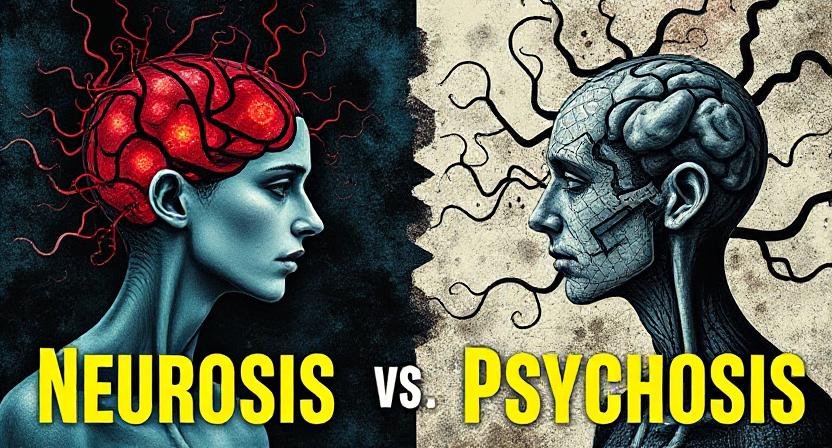What are the differences when it comes to debating about neurosis vs psychosis? This is a question that many people have, especially those struggling with one of these conditions. In this post, we will explore the differences between neurosis and psychosis and provide some information on each condition. We hope that this information will be helpful to those who are trying to determine which condition they may be dealing with Neurosis vs Psychosis.
Neurosis
Let’s begin by exploring neurosis. According to the American Psychological Association (APA), “neurosis is a term used to describe a mental condition in which feelings of anxiety, obsessions and compulsions, depression, and other psychological disorders produce symptoms that may be mild or severe.”
There are varying degrees of neurosis, ranging from mild to severe. According to the DSM, a manual used by psychologists and psychiatrists, there are nine different types of neurosis: conversion disorder, hypochondriasis, body dysmorphic disorder, somatization disorder (also known as Briquet’s syndrome), obsessive-compulsive disorder (OCD), anxiety disorder, depressive personality disorder, obsessive-compulsive personality disorder and factitious disorder. To be diagnosed with neurosis, an individual must display at least three symptoms above.
In comparison to psychosis, someone who suffers from neurosis may show signs of anxiety or depression but will not have a break from reality. This means they will not experience hallucinations or delusions, and their thought patterns may be more rational.
Psychosis
Psychosis is a mental illness that affects the mind, how one perceives and interprets reality and one’s environment (including other people). According to the World Health Organization (WHO), “psychotic illnesses are characterized by a loss of contact with reality, which may take the form of hallucinations (for example, hearing voices or seeing things that do not exist), delusions (erroneous fixed beliefs) and extremely disordered thinking and behaviour.”
Hallucinations are false perceptions that appear natural. Hallucinations can occur in all five senses: sight, smell, taste, touch and hearing. For example, someone hallucinating may see or hear things other people do not perceive.
Delusions are false beliefs that have no basis in reality. Nevertheless, individuals with delusions firmly believe these false ideas to be actual. For example, individuals with paranoid delusions may believe that the government is constantly monitoring their activities or that a neighbour is plotting to kill them.
According to the DSM, there are five different types of psychosis.
Brief psychotic disorder
schizophrenia
schizophreniform disorder
schizoaffective disorder and delusional disorder
Individuals diagnosed with one of these conditions will have experienced delusions or hallucinations for at least one month.
Regarding the differences between neurosis and psychosis, it is essential to note that an individual with neurosis may appear strange or eccentric to others but will not have delusions or hallucinations. Some people living with neurosis can transition into psychosis if they are under increased stress levels. Contact a mental health professional immediately if you are concerned about yourself or a loved one.
Neurosis vs psychosis – What’s the difference?
Psychosis is more severe than neurosis. Neurosis is milder and does not involve delusions or hallucinations as psychosis can. In contrast to those who have neurosis, someone who has psychosis may have trouble functioning normally, may withdraw socially, and may not keep up their usual routine.
Those who suffer from neurosis do not require medical treatment but psychological therapy. Neurosis is considered the more treatable condition of the two as it is typically on a continuum that can be managed by individuals trying to recover. Many therapists and psychologists consider psychosis to be more severe than neurosis because it may cause someone who has this condition to lose touch with reality, become socially withdrawn or act erratically.
Is It Neurosis Or Psychosis?
So how do you know if what you are experiencing is neurosis or if it is psychosis? Depending on the individual’s symptoms, recovering from neurosis or psychosis can be very different. Even though there are similarities between the two conditions. It is essential to note that they have unique characteristics and symptoms.
Psychosis may be more severe than neurosis. With proper treatment (psychological therapy or medication, depending on the case), some people living with psychosis can live more functional lives. Someone who has an episode of psychosis may regain their insight and recognize that they have been suffering from a mental health condition. In some instances, symptoms of neurosis may go away on their own, but symptoms can return.
Conclusion
Neurosis (also known as neurotic disorder) is typically considered less severe than psychosis. Of the two, neurosis is more likely to be treatable and can potentially go into remission with effective treatment. Neurosis includes anxiety attacks, feelings of detachment from others and reduced social functioning.
Psychosis is a mental health condition that involves a person experiencing delusions, hallucinations or disorganized speech and behavior. It is treatable. If you want to take an inspiration about how to recover from psychosis, read How a Young Man Successfully Learned to Manage Psychosis, Anxiety and Paranoia.
Contact your doctor immediately if you are concerned about yourself or a loved one.





